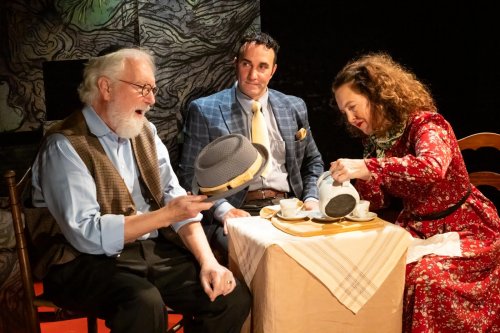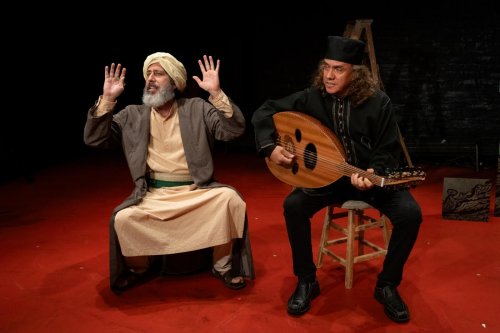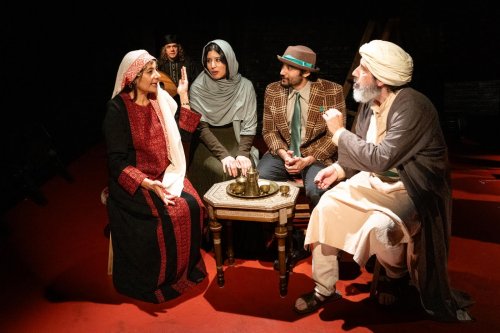Oud Player on the Tel
The conflict in the Middle East as seen through the prism of two families in post World War II Palestine.

Hari Bhaskar and Mark J. Quiles in a scene from Tom Block’s “Oud Player on the Tel” at HERE Arts Center (Photo credit: Steven Pisano)
Can the tale of two families living in Palestine just before the partition that created the State of Israel shine a light on the current status of affairs?
Playwright Tom Block’s Oud Player on the Tel does just that with a combination of wit and empathy. The play, currently at HERE Arts Center in SoHo, is part of HERE’s SubletSeries.
Melke (Mark Peters) and his immediate family escaped the worst of the Holocaust by taking refuge with his extended family in Switzerland. In 1947, newly arrived in what was still called Palestine after leaving war-wounded Europe, he meets the Arab Palestinian Amir (Mark J. Quiles) tending to his centuries old olive grove. The two old men bond immediately, Amir gifting Melke a cutting from one of his beloved olive trees.
Amir invites Melke and his family to an intimate dinner graciously hosted by Fatima, Amir’s sister (Inji El Gammal), her son Mahmud (Hari Bhaskar) and himself.
Melke’s son, Moritz (Gary Brintz), rudely insults Amir’s family with racist tropes, embarrassing Melke and sparking negative feelings between the two families. Melke’s sister Shoshana (Jennifer G. R. Tulchin) also chimes in, expressing anti-Muslim feelings.

Mark Peters, Gary Brintz and Jennifer G. R. Tulchin in a scene from Tom Block’s “Oud Player on the Tel” at HERE Arts Center (Photo credit: Steven Pisano)
Difficulties arise when Moritz flirts with and falls in love with Rashida (Maya Koshaba) a niece of Amir, a relationship with an uneasy—if not doomed—future.
Further complications arise when Mahmud decides to become a “new used car” salesman after seeing an advertisement for the American David Gordon’s business. At the same time Moritz goes into the same line of business causing even more friction. Both men adopt the American’s name, Mahmud not realizing that it is a Jewish name.
The climax of the play comes with the announcement of the partition decree that created the new State of Israel. Each character has to face extraordinary challenges. Will Rashida stay with the Jewish Moritz? Which used car entrepreneur will succeed? And, will the friendship of the two seniors, Melke and Amir, survive the political and social turmoil foisted upon them?
Although Block takes pains to remain a neutral observer, the newly minted Israelis come off as insensitive, entitled and blind to the plight of the Arab Palestinians whose lives and livelihoods were to be destroyed. Zionist ambitions, hoisted by all the revelations of the dreadful Holocaust, triumphed.
History has proven Israel successful masters of the land they were given, but these troublesome issues, so movingly portrayed in miniature in Oud Player still plague this war-torn part of the world.

Mark J. Quiles and Rachid Halihal in a scene from Tom Block’s “Oud Player on the Tel” at HERE Arts Center (Photo credit: Steven Pisano)
At the end of the play only Amir and Melke remain calmly philosophical although it is clear that their relationship is damaged beyond repair. Both Peters and Quiles create warm portraits of these two stalwarts and become the calm center of the storm raging around them.
Where Moritz’s distrust of the Arabs comes from isn’t clearly defined, but Brintz makes the character complex, especially as he is torn by his romance with the warm and complex Rashida as portrayed by Koshaba.
Mahmud comes across as a bit of a naïve fool, but Bhaskar makes him sympathetic and even likeable.
The women are a bit underwritten but El Gammal and Tulchin nevertheless are vivid characters.
Even though the play is billed as absurdist, Jesica Garrou’s direction emphasizes the emotional elements rather than the stylistic ones, more Chekhov than Beckett.

Inji El Gammal, Maya Koshaba, Hari Bhaskar and Mark J. Quiles in a scene from Tom Block’s “Oud Player on the Tel” at HERE Arts Center (Photo credit: Steven Pisano)
The modest but expressive set designed by Richie Ouellette features a mosaic of hanging paintings that coalesced into a stylized portrait of an expansive olive tree. The automobiles that Moritz and Mahmud use to represent their wares are witty re-creations of the front ends of period cars.
Cathy Small’s costumes modestly define character with ethnic accuracy and a quiet color palette. These costumes allowed the simple choreography (Hala Shah) and the fight direction (Gary Brintz) to move organically.
Riva Fairhall’s lighting turns the tiny basement theater into an interesting multilayered space.
Throughout the play the actual oud player, Rachid Halihal, provides mood music that melds East and West. His bemused presence hovers over the play.
Oud Player on the Tel, presented by the International Human Rights Art Movement, makes human-scaled observations that are particularly potent right now.
Oud Player on the Tel (through November 24, 2024)
HERE SubletSeries
International Human Rights Arts Movement
HERE Arts Center, 145 Sixth Avenue, in Manhattan
For tickets, visit http://www.oudplayeronthetel.com
Running time: 70 minutes without an intermission






Leave a comment